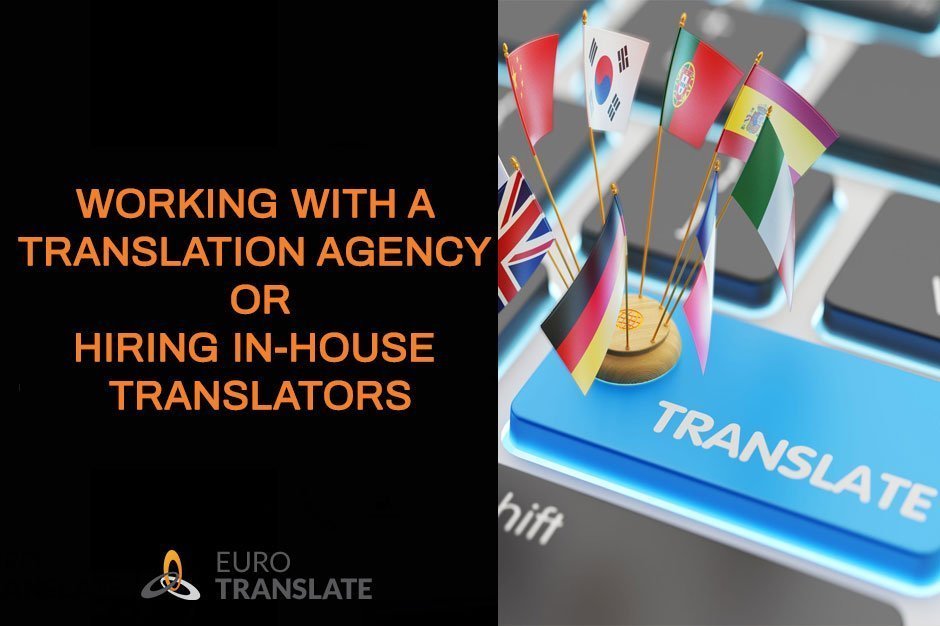
Does your company do business with foreign markets? Have a lot of clients from all over the world? Or plans to expand into a new market? One thing you’re going to need is someone to translate all the documents involved into the languages of the new markets.
This recurring need for high-quality translations brings up a new dilemma: should you hire an in-house, full-time translator or start working with a translation agency? To help you make the right decision, here we provide an overview of the differences and the situations that might help sway you one way or the other.
LANGUAGES
A question to consider: Do you need someone to cover one language combination or several of them? Do your needs lean only towards one foreign market with one official language, or more markets/languages?
You will want to hire an in-house translator for one language combination, but what happens when translation requirements for different languages come up? Yes, sure, Maria from HR can handle Spanish – she did spend a gap year in Spain, didn’t she? But since translation is not really in her job description and she has never tackled legal expressions and the intricacies of a contract before, is she really your best choice?
Joking aside, a translation agency will have the expert resources to cover multiple languages, even for large-volume projects where the agency will delegate multiple linguists to meet the deadlines, if necessary.
RANGE
A question to consider: What is the main subject matter of the documents that need to be translated? Are they brochures and promotional materials? User and instruction manuals? Contracts and agreements?
When deciding to hire a translator, you may choose to find one who specialises in your company’s industry. However, sometimes your translation needs will include other fields, such as legal (for contracts and agreements), marketing (for promotions, brochures), business (for meetings and internal documents), to name just a few. Don’t expect your in-house translator to be a jack-of-all-trades and a master-of-all-fields. In these cases, a translation agency with a wide pool of available, specialist linguists will be your best bet as they will assign a translator who is an expert in the field to the document that needs to be translated.
QUALITY CONTROL
A question to consider: What level of editing and proofreading is required for the documentation? Formatting? (Again, coming back to the type of documentation and usual formats.)
Having an in-house translator means that one person will be in charge of all the editing, proofreading, formatting and revision after their own translations. Of course, this is not an impossible feat, but two sets of eyes are always better.
A translation agency will have specialist revisers, editors, and proofreaders ready to tackle any project. In addition, for translations into foreign languages, an agency will have linguists who are native speakers ready to work on these translation projects.
SPEED
A question to consider: What is the volume that need to be translated and what are the deadlines for delivery?
However good your in-house translator may be, there is still only so much one person can do in terms of daily output. When it comes to large-volume projects or deadline-sensitive campaigns that you needed done yesterday, a translation agency will be able to coordinate several teams of specialised translators and have it completed much faster, right on time for that important meeting!
CONSISTENCY
A question to consider: Is there a consistent brand voice and communication tone you need to uphold in all your documents?
An in-house translator will become very familiar with the brand guidelines and its voice, carrying it through all documents. It is also highly beneficial for in-house translators to use CAT tools, creating a translation memory for all your documents, thus ensuring that the terminology used in them is consistent across the board.
If your in-house translator is not comfortable with using CAT tools, a good idea would be to get a translation agency to set up a system and train the translator in using the selected CAT tool, making sure that the whole process is set up so as to promote efficiency and consistency in translation jobs.
When many different language combinations are required, taking advantage of the services of a translation agency really is the best choice, since they will use terminology lists and translation memory to ensure that your company is represented consistently and appropriately, in every language. This way you know you’re using the same style and terms across the world.
ADDITIONAL SERVICES
A question to consider: What documents are most frequently translated? Are there any patterns (for example, certain documents at certain points of the year)? Are most of your documents in non-editable formats, such as PDF, and include design elements? Are some translations only one-off tasks?
It would be unrealistic to expect one in-house translator to be able to deal with website localisation, campaign tagline transcreation, SEO-optimised Google ads, press release proofreading, and translation of highly technical operations manual with all the graphs and technical drawings, plus legal contracts! Knowing the strengths and weaknesses of your in-house staff is a must, because it can you save time, money and headaches by outsourcing the jobs they are not comfortable with.
In such cases, using the services of a reputable translation agency ensures all types of linguistic projects are done in a professional manner, by an expert in the field.
AFFORDABILITY
A question to consider: Is there a regular flow of translation needs, or do these only happen occasionally? For example, after translating your own website, what other materials will follow?
Having a full-time employee involves the additional costs of their pension plan, health insurance, and other benefits. What if there is no constant flow of work keeping this person busy for all of their working hours?
When you cooperate with a translation agency, you only pay for the work that you need done, and nothing else. No benefits, no additional expenses.
